Abstract
In three experiments, 8 human subjects participated in a study of the effects of smoked marijuana on progressive-interval schedule performance. A two-component chained progressive-interval fixed-interval schedule of point delivery was used. In the progressive-interval component, the interval length began at 20 s and increased either geometrically or arithmetically (by either 20 s, 40 s, 80 s, 100 s, or 160 s) on each subsequent interval. After this interval elapsed, a single button press produced the fixed-interval component, with a total of five reinforcers of varying magnitude ($0.05, $0.20, or $0.40) available on a fixed-interval 20-s schedule. After the five reinforcer deliveries, the schedule returned to the initial progressive-interval component. Several relationships were found among rates of responding, postreinforcement pauses and drug administration in the progressive-interval component: (a) Postreinforcement pauses increased as the temporal requirements of the progressive-interval schedule increased; (b) rates of responding during successive progressive-interval components rapidly decreased to low rates of responding after the first few progressions; (c) postreinforcement pauses decreased systematically as dose of smoked marijuana increased; and (d) rates of responding increased after smoking active marijuana but not after smoking placebo cigarettes. Results are discussed in the context of behavioral control and relevance to other studies that have investigated the effects of smoked marijuana on schedule performance.
Full text
PDF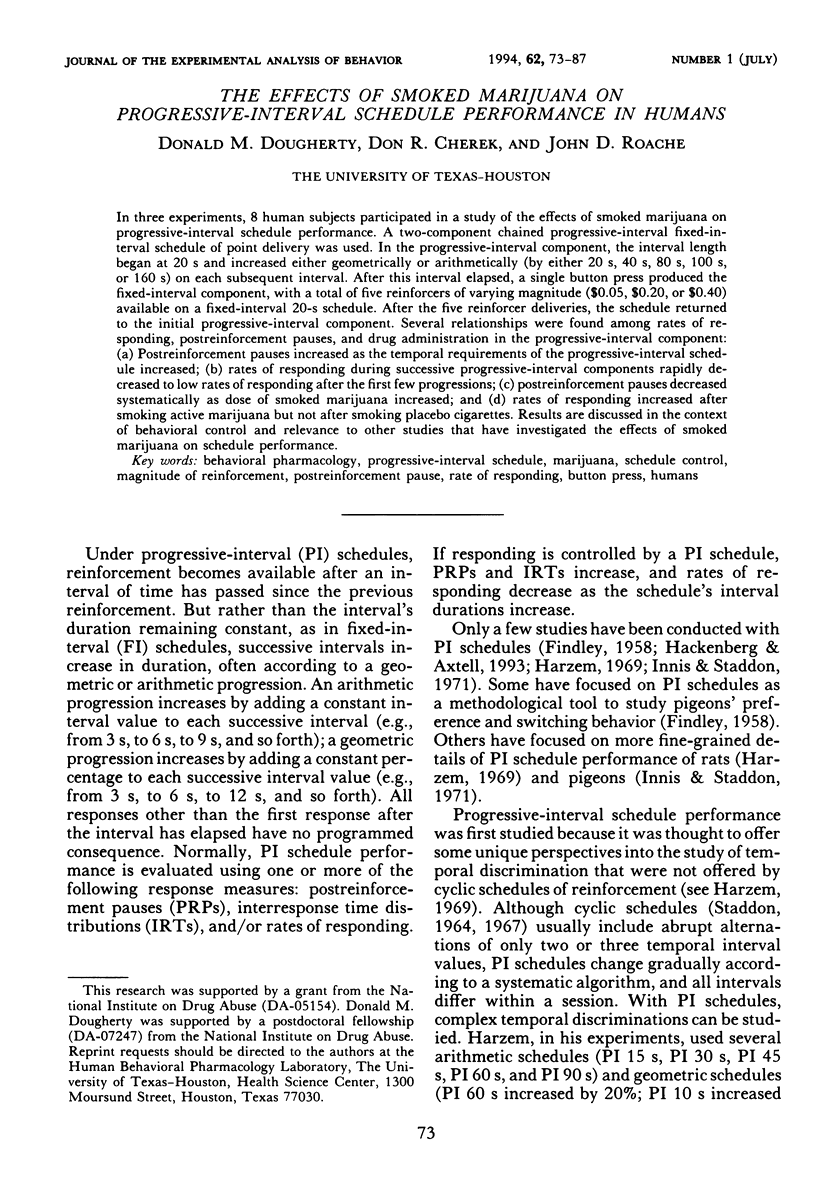
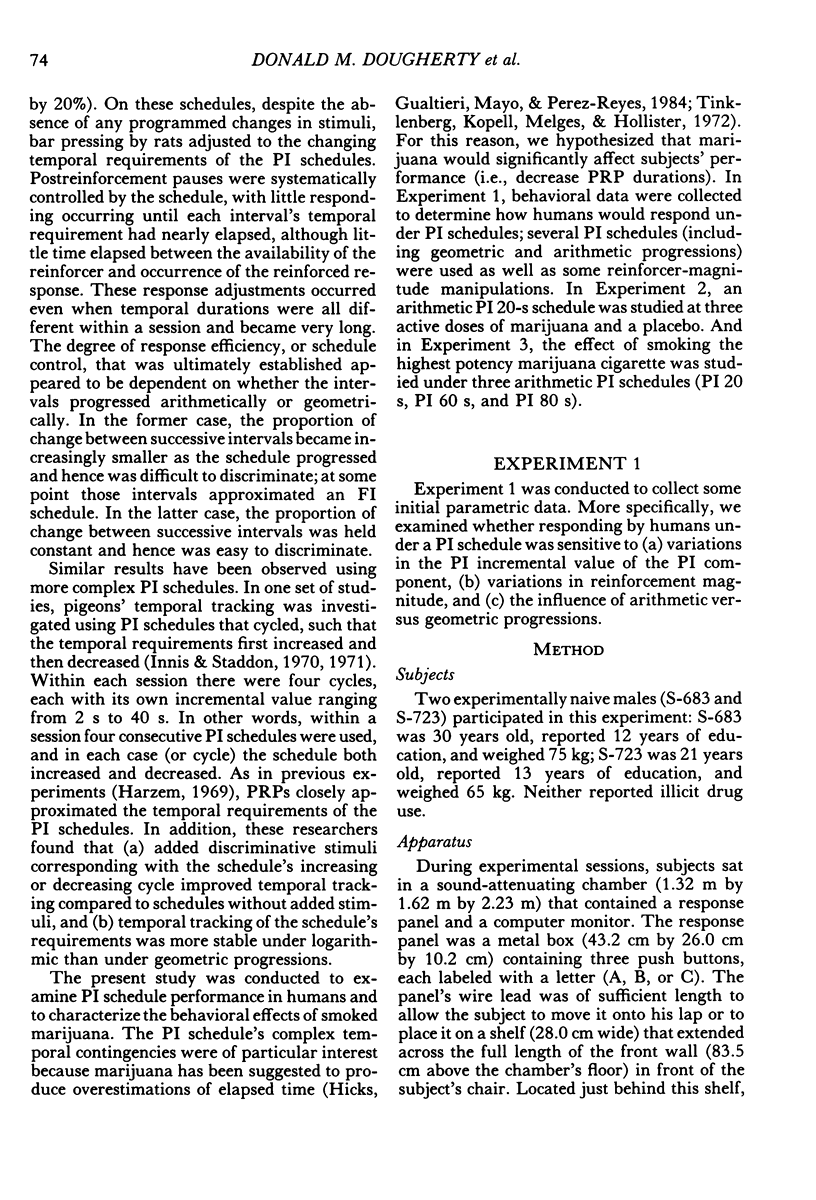
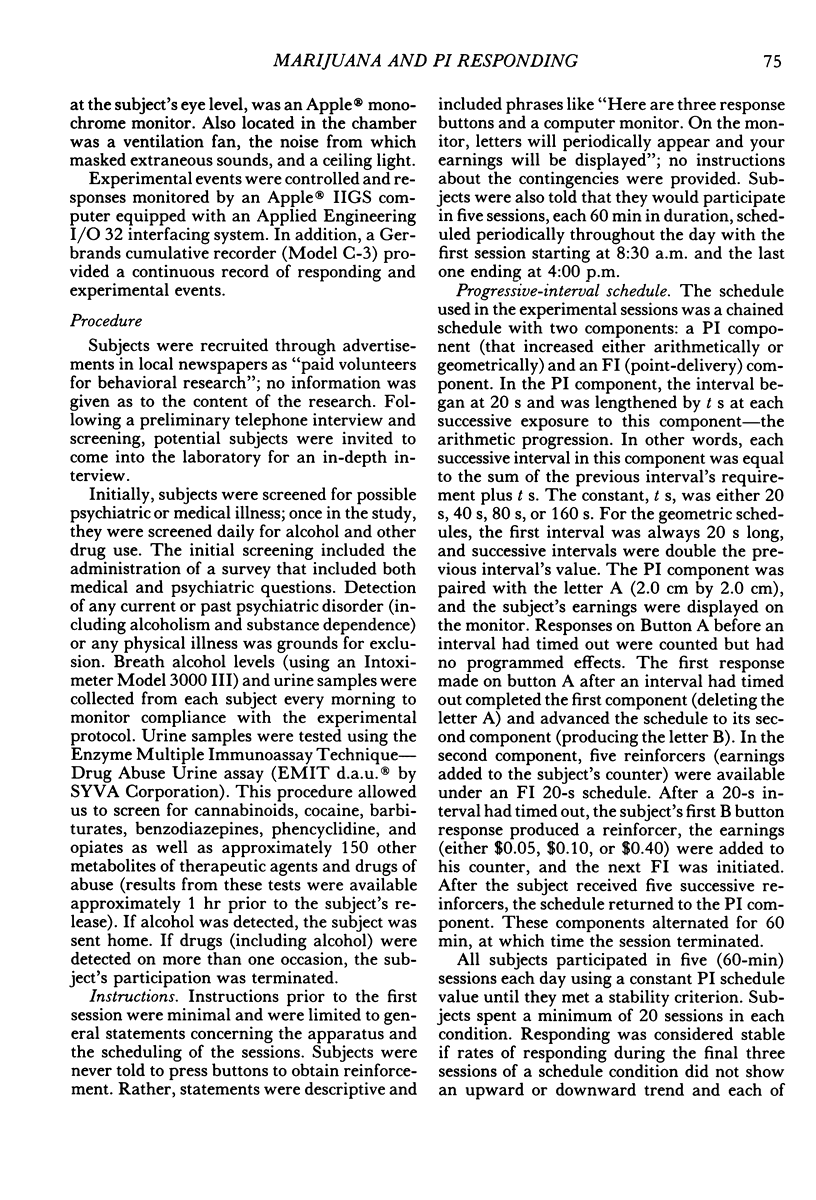
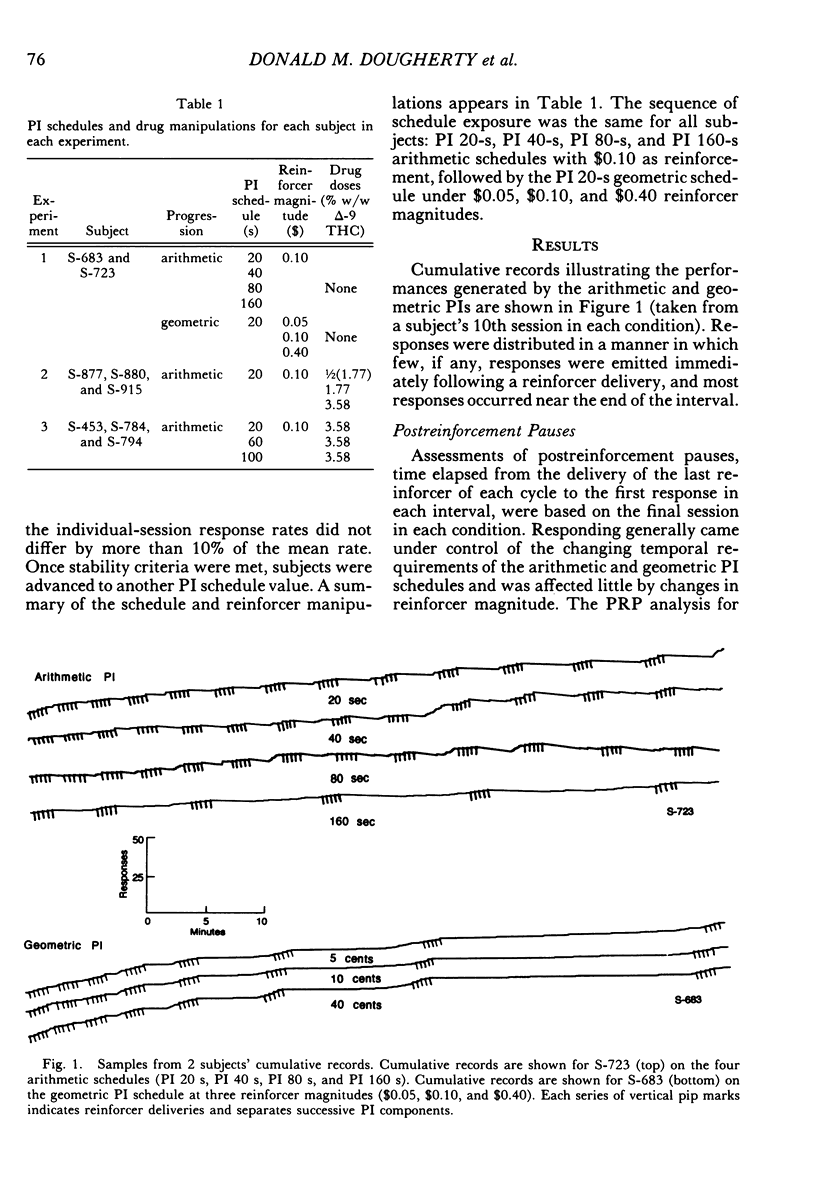
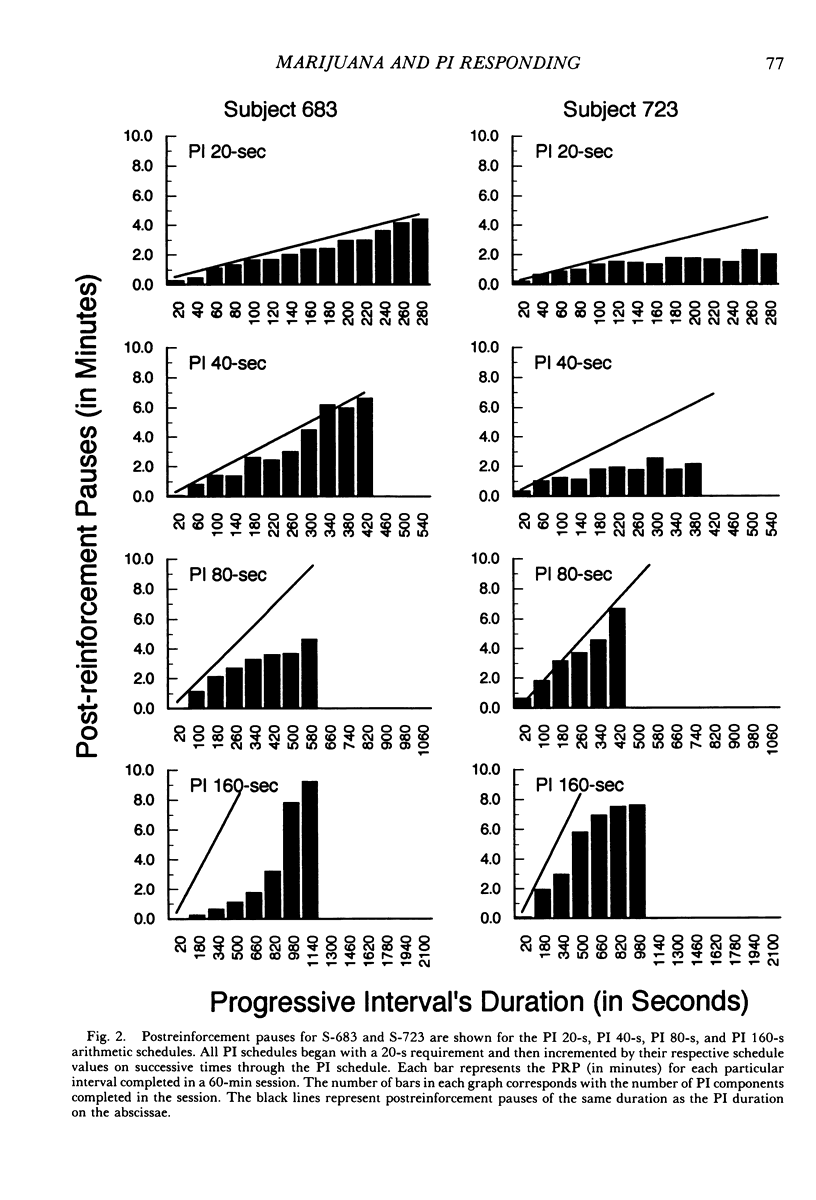
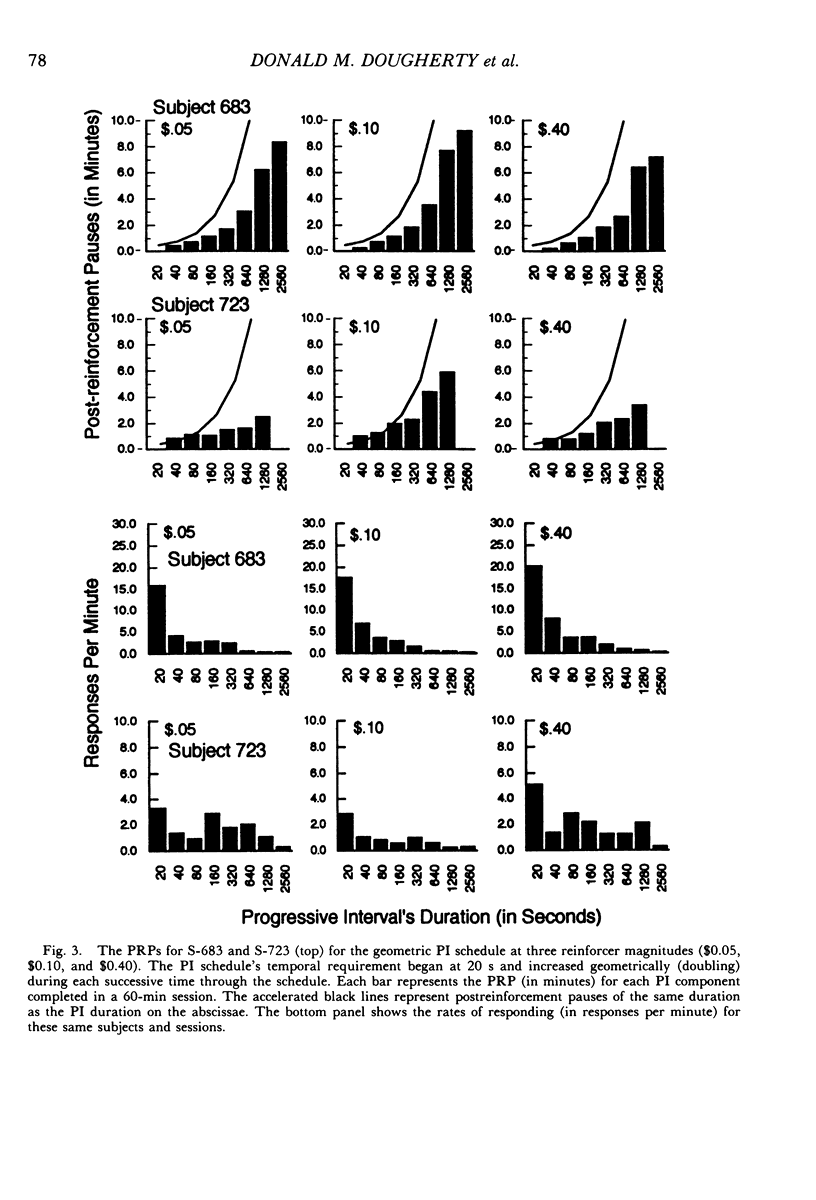
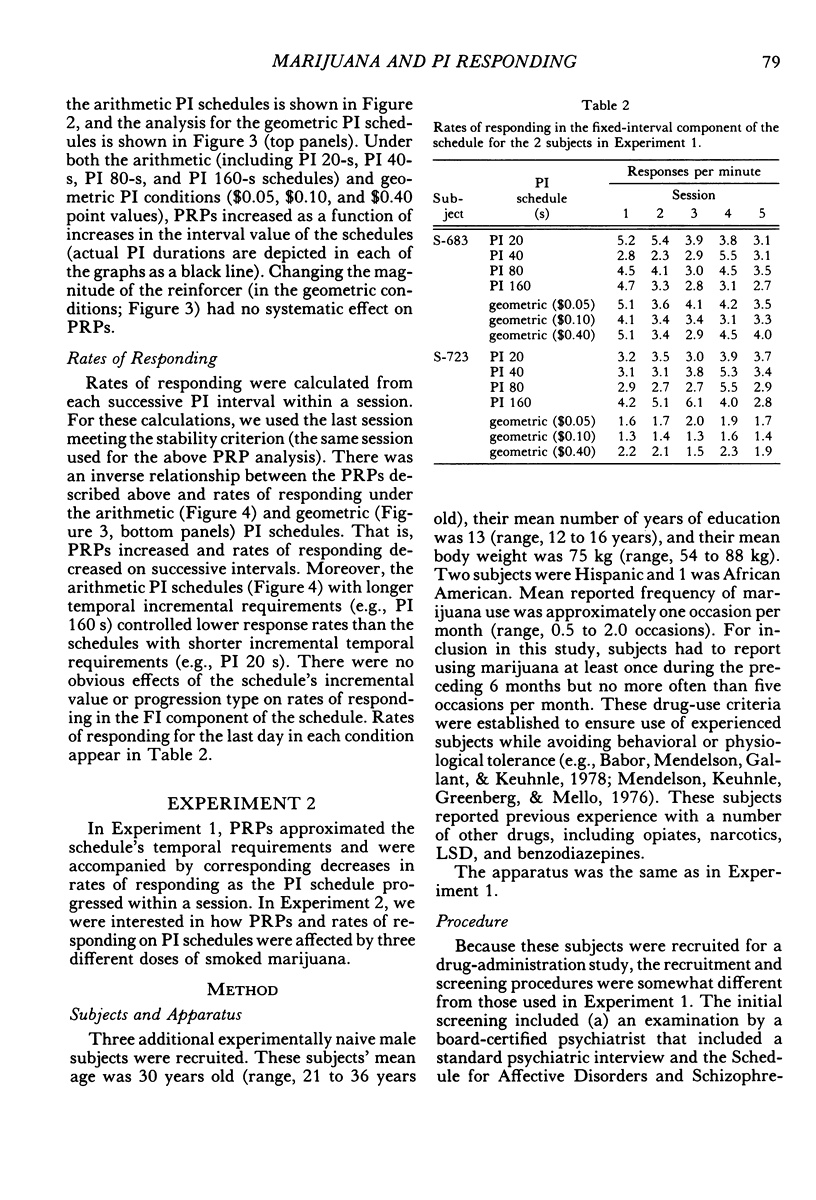
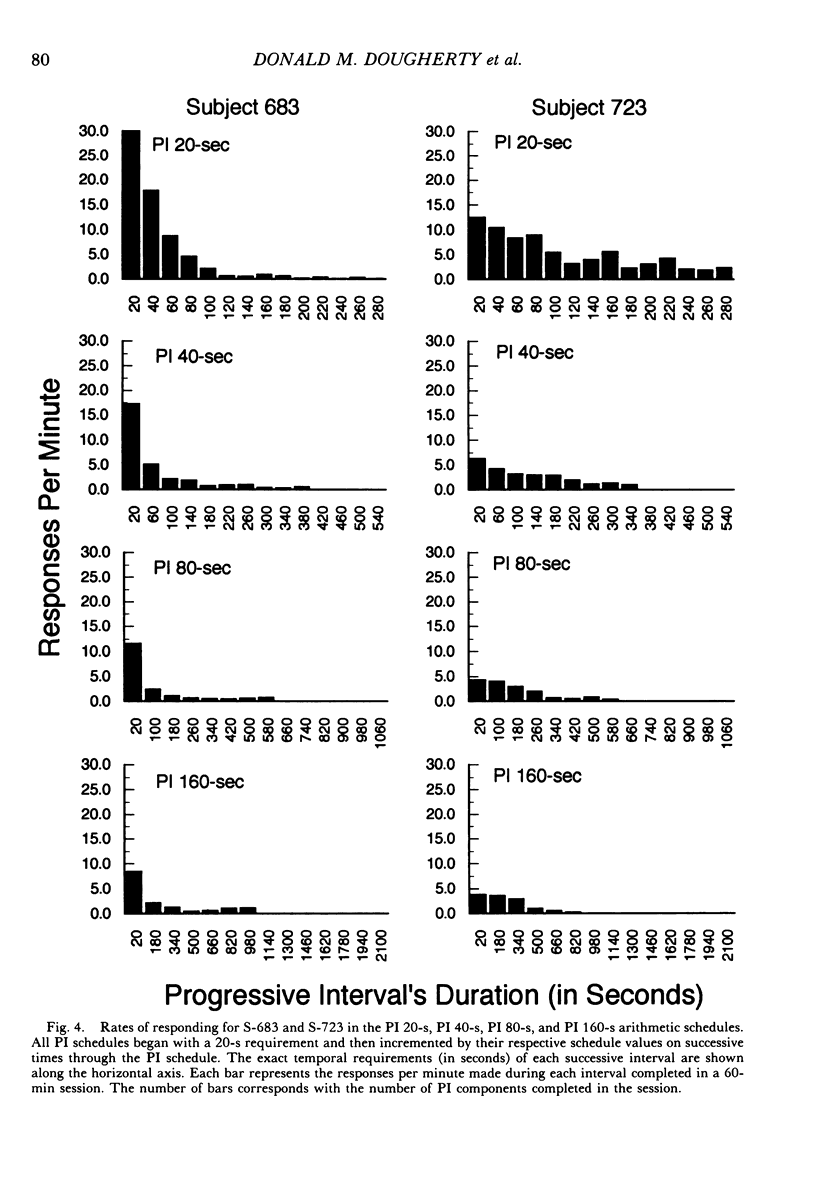
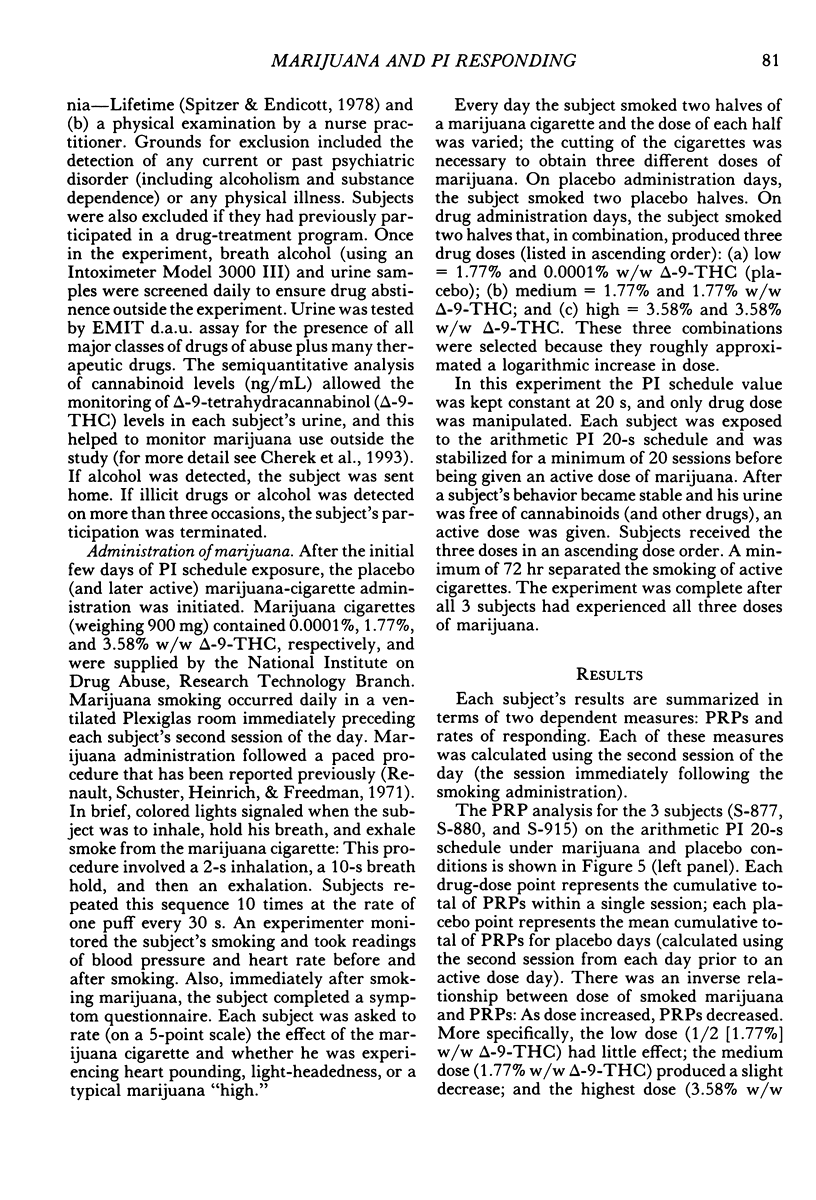
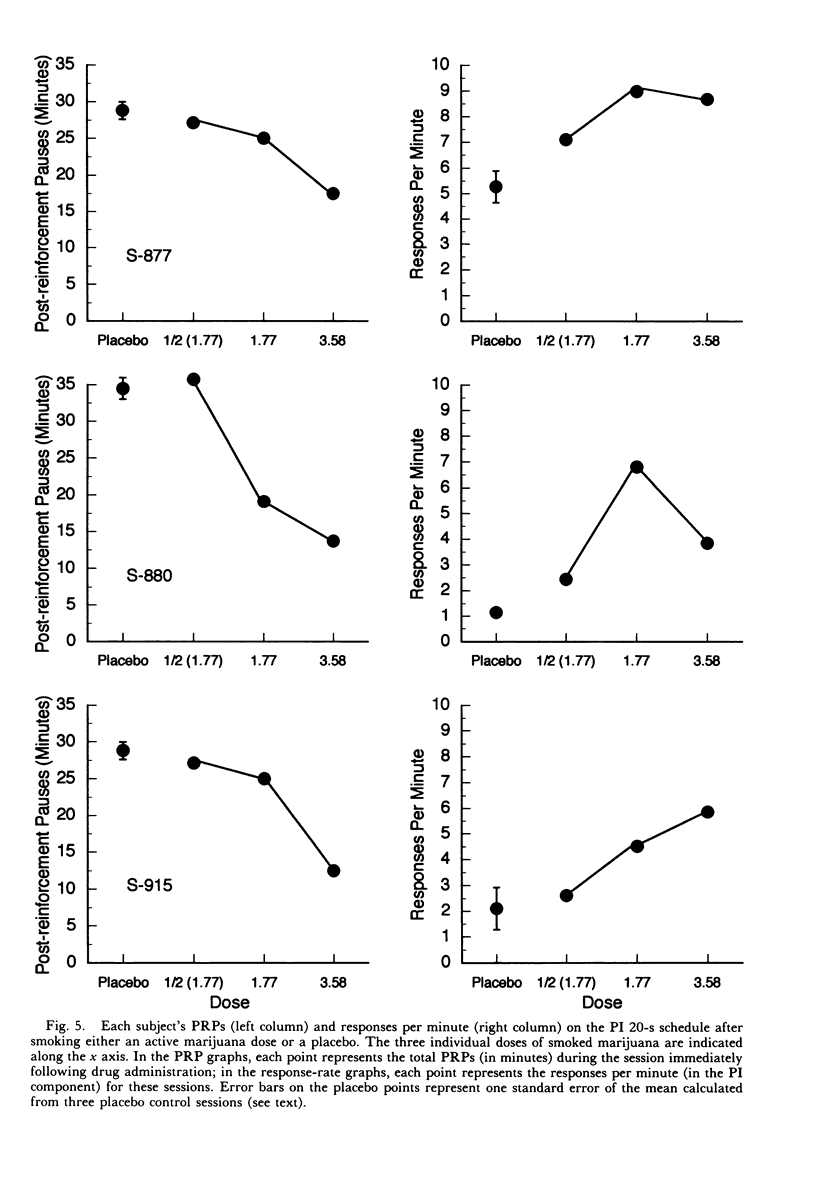
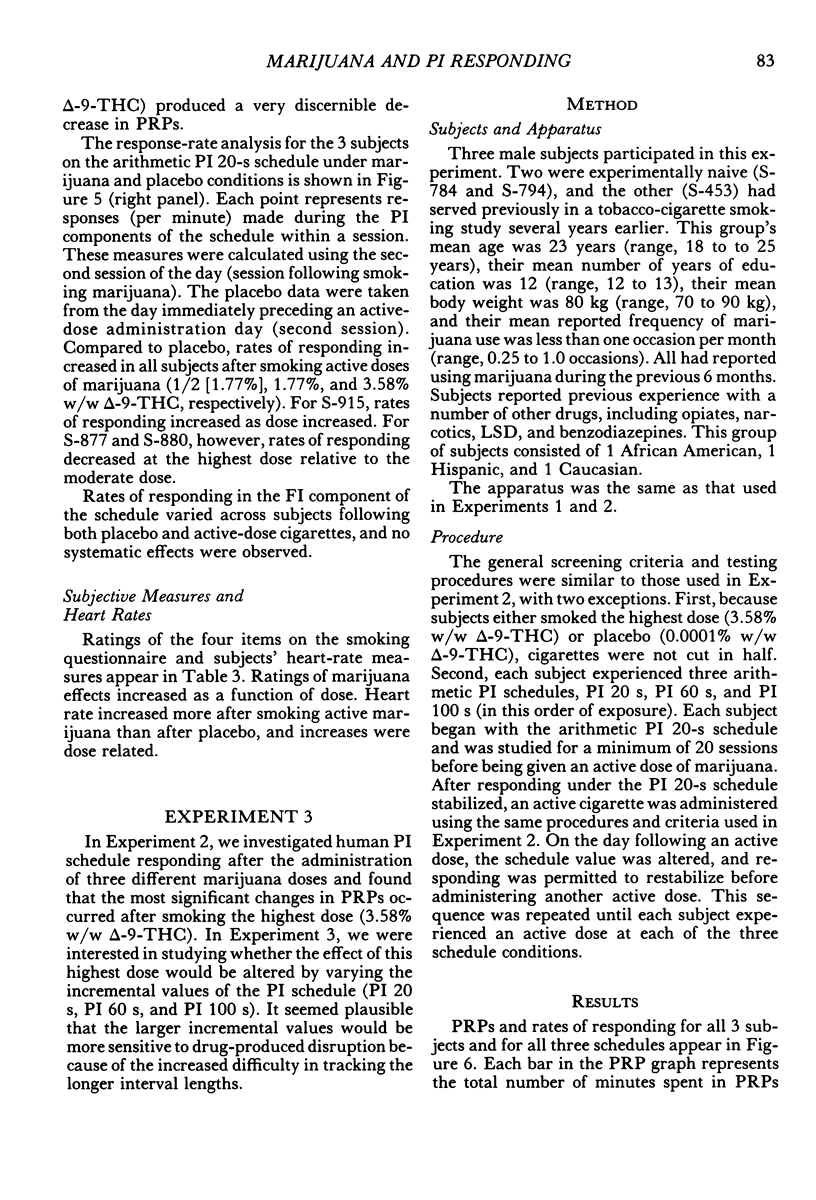
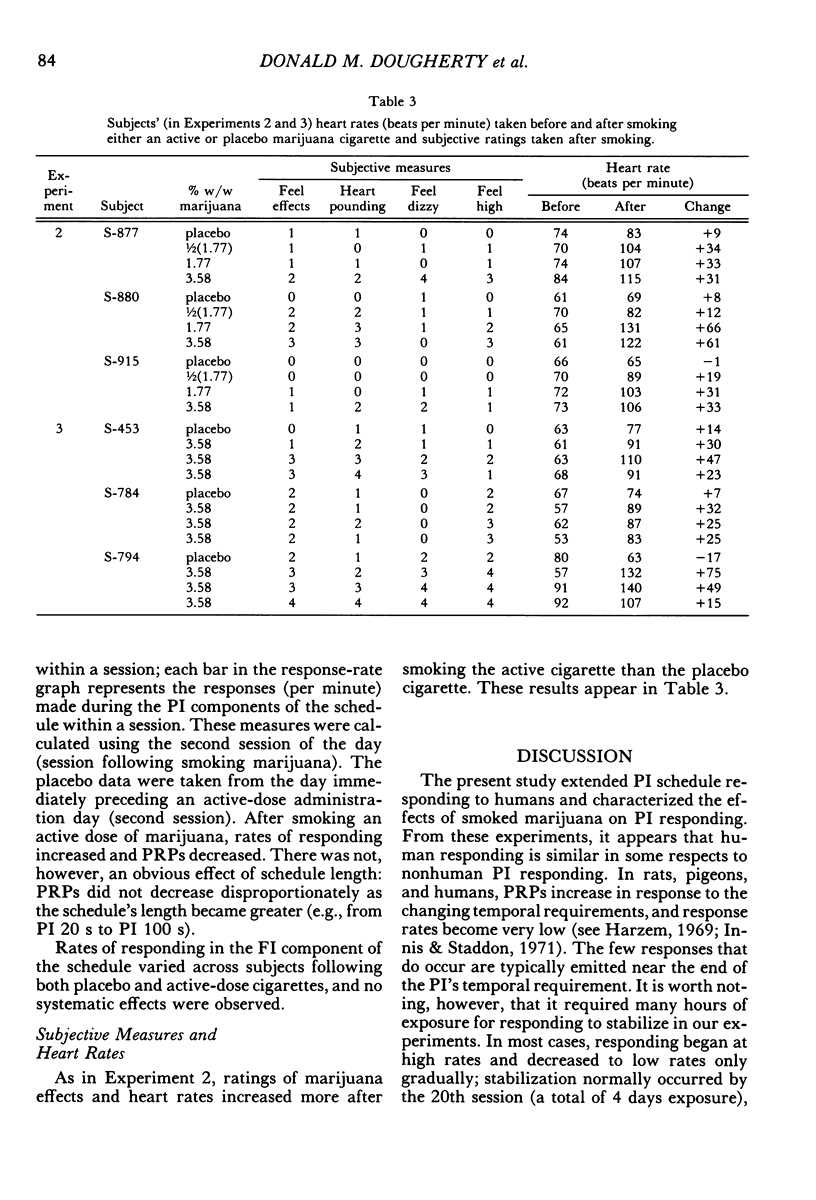
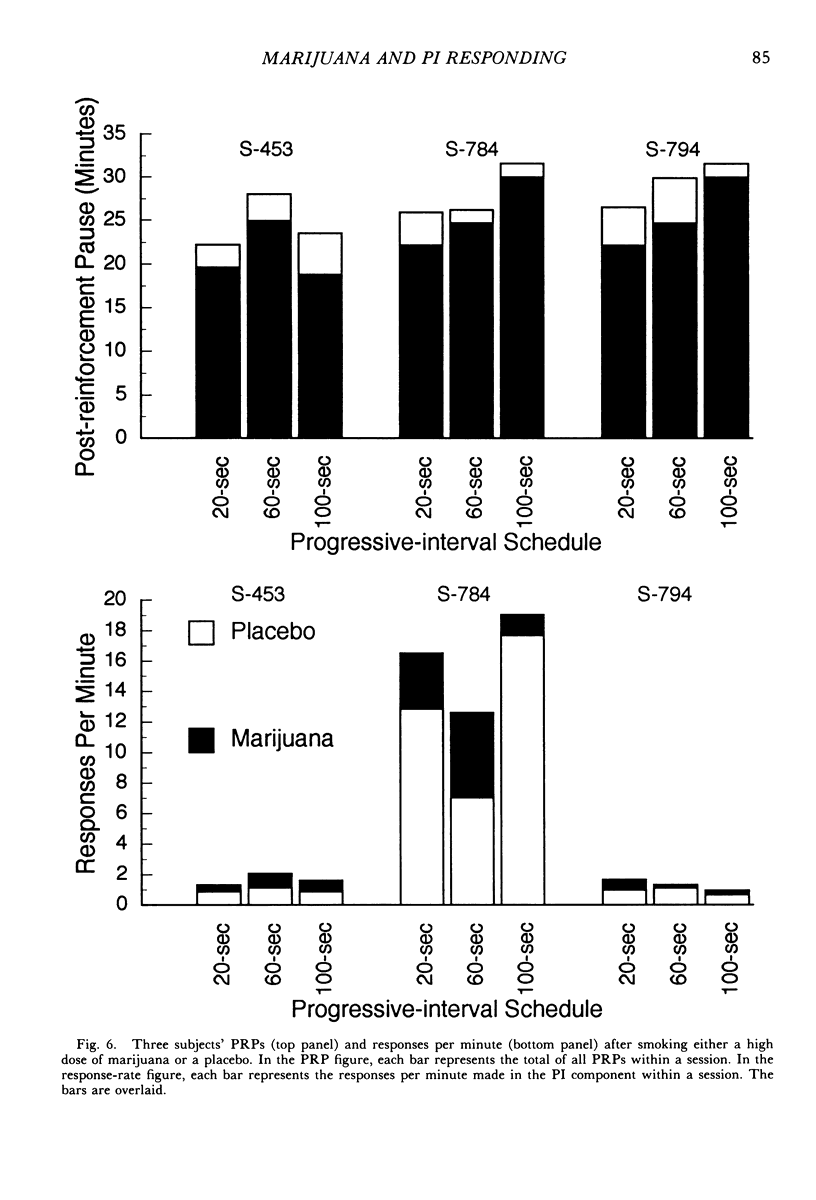
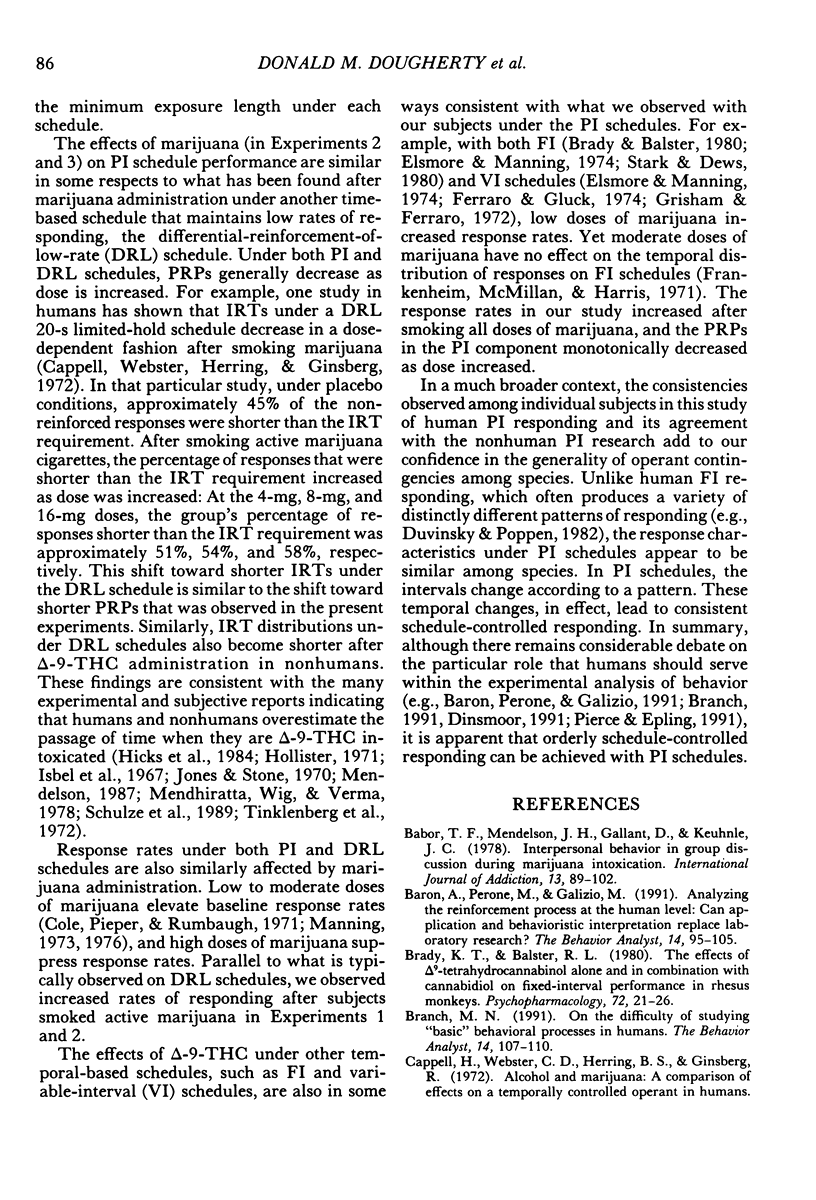
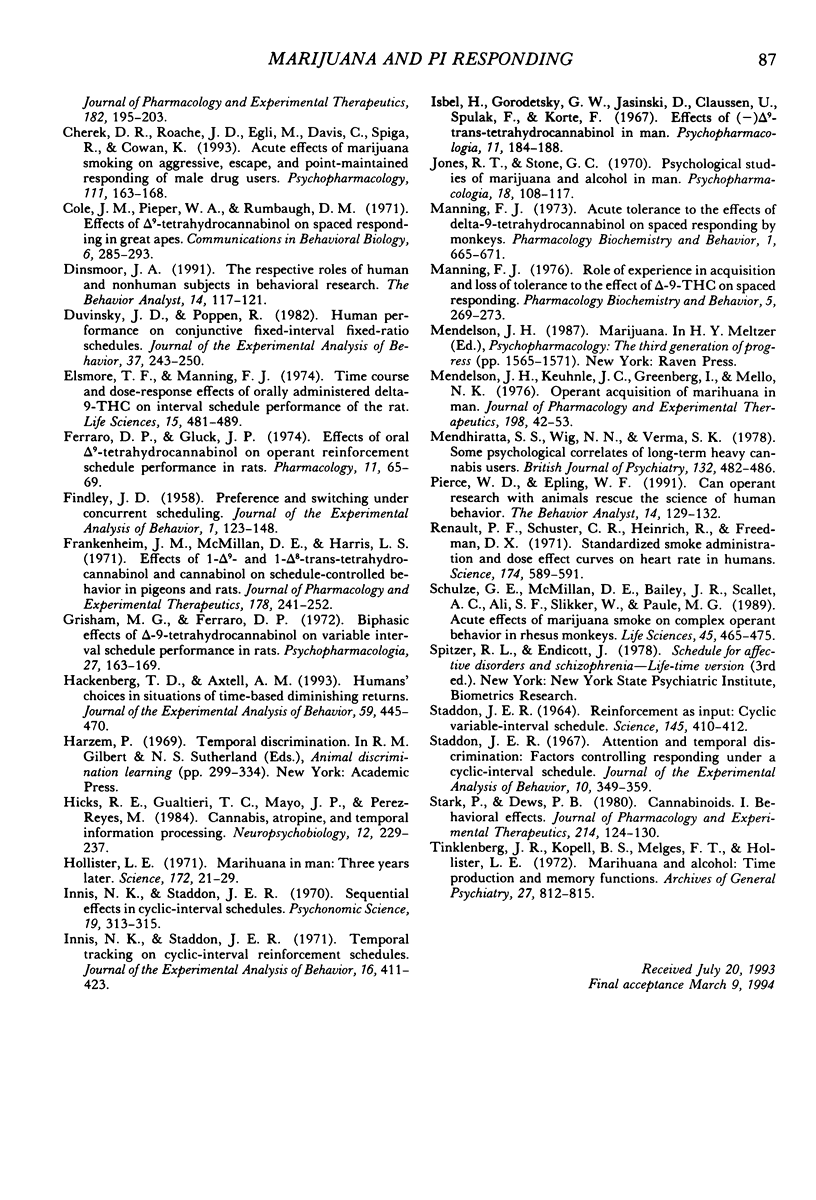
Selected References
These references are in PubMed. This may not be the complete list of references from this article.
- Babor T. F., Mendelson J. H., Gallant D., Kuehnle J. C. Interpersonal behavior in group discussion during marijuana intoxication. Int J Addict. 1978 Jan;13(1):89–102. doi: 10.3109/10826087809039266. [DOI] [PubMed] [Google Scholar]
- Brady K. T., Balster R. L. The effects of delta 9-tetrahydrocannabinol alone and in combination with cannabidiol on fixed-interval performance in rhesus monkeys. Psychopharmacology (Berl) 1980;72(1):21–26. doi: 10.1007/BF00433803. [DOI] [PubMed] [Google Scholar]
- Cherek D. R., Roache J. D., Egli M., Davis C., Spiga R., Cowan K. Acute effects of marijuana smoking on aggressive, escape and point-maintained responding of male drug users. Psychopharmacology (Berl) 1993;111(2):163–168. doi: 10.1007/BF02245518. [DOI] [PubMed] [Google Scholar]
- Duvinsky J. D., Poppen R. Human performance on conjunctive fixed-interval fixed-ratio schedules. J Exp Anal Behav. 1982 Mar;37(2):243–250. doi: 10.1901/jeab.1982.37-243. [DOI] [PMC free article] [PubMed] [Google Scholar]
- Elsmore T. F., Manning F. J. Time course and dose-response effects of orally administered delta-9-THC on interval schedule performance of the rat. Life Sci. 1974 Aug 1;15(3):481–489. doi: 10.1016/0024-3205(74)90346-4. [DOI] [PubMed] [Google Scholar]
- Ferraro D. P., Gluck J. P. Effects of oral delta9-tetrahydrocannabinol on operant reinforcement schedule performance in rats. Pharmacology. 1974;11(2):65–69. doi: 10.1159/000136469. [DOI] [PubMed] [Google Scholar]
- Findley J. D. Preference and Switching under Concurrent Scheduling. J Exp Anal Behav. 1958 Apr;1(2):123–144. doi: 10.1901/jeab.1958.1-123. [DOI] [PMC free article] [PubMed] [Google Scholar]
- Frankenheim J. M., McMillan D. E., Harris L. S. Effects of l-delta9- and l-delta8-trans-tetrahydrocannabinol and cannabinol on schedule-controlled behavior of pigeons and rats. J Pharmacol Exp Ther. 1971 Jul;178(1):241–252. [PubMed] [Google Scholar]
- Grisham M. G., Ferraro D. P. Biphasic effects of 9 -tetrahydrocannabinol on variable interval schedule performance in rats. Psychopharmacologia. 1972;27(2):163–169. doi: 10.1007/BF00439375. [DOI] [PubMed] [Google Scholar]
- Hackenberg T. D., Axtell S. A. Human's choices in situations of time-based diminishing returns. J Exp Anal Behav. 1993 May;59(3):445–470. doi: 10.1901/jeab.1993.59-445. [DOI] [PMC free article] [PubMed] [Google Scholar]
- Hicks R. E., Gualtieri C. T., Mayo J. P., Jr, Perez-Reyes M. Cannabis, atropine, and temporal information processing. Neuropsychobiology. 1984;12(4):229–237. doi: 10.1159/000118144. [DOI] [PubMed] [Google Scholar]
- Hollister L. E. Marihuana in man: three years later. Science. 1971 Apr 2;172(3978):21–29. doi: 10.1126/science.172.3978.21. [DOI] [PubMed] [Google Scholar]
- Innis N. K., Staddon J. E. Temporal tracking on cyclic-interval reinforcement schedules. J Exp Anal Behav. 1971 Nov;16(3):411–423. doi: 10.1901/jeab.1971.16-411. [DOI] [PMC free article] [PubMed] [Google Scholar]
- Isbell H., Gorodetzsky C. W., Jasinski D., Claussen U., von Spulak F., Korte F. Effects of (--)delta-9-trans-tetrahydrocannabinol in man. Psychopharmacologia. 1967;11(2):184–188. doi: 10.1007/BF00401256. [DOI] [PubMed] [Google Scholar]
- Jones R. T., Stone G. C. Psychological studies of marijuana and alcohol in man. Psychopharmacologia. 1970 Aug 19;18(1):108–117. doi: 10.1007/BF00402390. [DOI] [PubMed] [Google Scholar]
- Manning F. J. Acute tolerance to the effects of delta-9-tetrahydrocannabinol on spaced responding by monkeys. Pharmacol Biochem Behav. 1973 Nov-Dec;1(6):665–671. doi: 10.1016/0091-3057(73)90030-0. [DOI] [PubMed] [Google Scholar]
- Manning F. J. Role of experience in acquisition and loss of tolerance to the effect of delta-9-THC on spaced responding. Pharmacol Biochem Behav. 1976 Sep;5(3):269–273. doi: 10.1016/0091-3057(76)90078-2. [DOI] [PubMed] [Google Scholar]
- Mendelson J. H., Kuehnle J. C., Greenberg I., Mello N. K. Operant acquisition of marihuana in man. J Pharmacol Exp Ther. 1976 Jul;198(1):42–53. [PubMed] [Google Scholar]
- Menhiratta S. S., Wig N. N., Verma S. K. Some psychological correlates of long-term heavy cannabis users. Br J Psychiatry. 1978 May;132:482–486. doi: 10.1192/bjp.132.5.482. [DOI] [PubMed] [Google Scholar]
- Renault P. F., Schuster C. R., Heinrich R., Freeman D. X. Marihuana: standardized smoke administration and dose effect curves on heart rate in humans. Science. 1971 Nov 5;174(4009):589–591. doi: 10.1126/science.174.4009.589. [DOI] [PubMed] [Google Scholar]
- STADDON J. E. REINFORCEMENT AS INPUT: CYCLIC VARIABLE-INTERVAL SCHEDULE. Science. 1964 Jul 24;145(3630):410–412. doi: 10.1126/science.145.3630.410. [DOI] [PubMed] [Google Scholar]
- Schulze G. E., McMillan D. E., Bailey J. R., Scallet A. C., Ali S. F., Slikker W., Jr, Paule M. G. Acute effects of marijuana smoke on complex operant behavior in rhesus monkeys. Life Sci. 1989;45(6):465–475. doi: 10.1016/0024-3205(89)90096-9. [DOI] [PubMed] [Google Scholar]
- Staddon J. E. Attention and temporal discrimination: factors controlling responding under a cyclic-interval schedule. J Exp Anal Behav. 1967 Jul;10(4):349–359. doi: 10.1901/jeab.1967.10-349. [DOI] [PMC free article] [PubMed] [Google Scholar]
- Stark P., Dews P. B. Cannabinoids. I. Behavioral effects. J Pharmacol Exp Ther. 1980 Jul;214(1):124–130. [PubMed] [Google Scholar]
- Tinklenberg J. R., Kopell B. S., Melges F. T., Hollister L. E. Marihuana and alcohol, Time production and memory functions. Arch Gen Psychiatry. 1972 Dec;27(6):812–815. doi: 10.1001/archpsyc.1972.01750300074013. [DOI] [PubMed] [Google Scholar]


